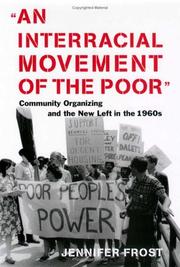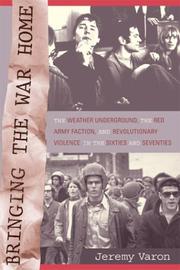| Listing 1 - 3 of 3 |
Sort by
|

ISBN: 0814728154 0585479348 9780585479347 9780814726976 0814726976 9780814728154 0814726984 Year: 2001 Publisher: New York (N.Y.) : New York university press,
Abstract | Keywords | Export | Availability | Bookmark
 Loading...
Loading...Choose an application
- Reference Manager
- EndNote
- RefWorks (Direct export to RefWorks)
Choice Outstanding Academic Title 2002. Community organizing became an integral part of the activist repertoire of the New Left in the 1960's. Students for a Democratic Society, the organization that came to be seen as synonymous with the white New Left, began community organizing in 1963, hoping to build an interracial movement of the poor through which to demand social and political change. SDS sought nothing less than to abolish poverty and extend democratic participation in America. Over the next five years, organizers established a strong presence in numerous low-income, racially diverse
Community development, Urban --- Economic Research and Action Project. --- Students for a Democratic Society (U.S.). --- ERAP --- American. --- campaign. --- community. --- first. --- full-fledged. --- history. --- innovative. --- most. --- organizing. --- post-war. --- what.
Book
ISBN: 9780231544337 0231544332 9780231182744 0231182740 Year: 2018 Publisher: New York, NY : Columbia University Press,
Abstract | Keywords | Export | Availability | Bookmark
 Loading...
Loading...Choose an application
- Reference Manager
- EndNote
- RefWorks (Direct export to RefWorks)
For seven days in April 1968, students occupied five buildings on the campus of Columbia University to protest a planned gymnasium in a nearby Harlem park, links between the university and the Vietnam War, and what they saw as the university's unresponsive attitude toward their concerns. Exhilarating to some and deeply troubling to others, the student protests paralyzed the university, grabbed the world's attention, and inspired other uprisings. Fifty years after the events, A Time to Stir captures the reflections of those who participated in and witnessed the Columbia rebellion.With more than sixty essays from members of the Columbia chapter of Students for a Democratic Society, the Students' Afro-American Society, faculty, undergraduates who opposed the protests, "outside agitators," and members of the New York Police Department, A Time to Stir sheds light on the politics, passions, and ideals of the 1960s. Moving beyond accounts from the student movement's white leadership, this book presents the perspectives of black students, who were grappling with their uneasy integration into a supposedly liberal campus, as well as the views of women, who began to question their second-class status within the protest movement and society at large. A Time to Stir also speaks to the complicated legacy of the uprising. For many, the events at Columbia inspired a lifelong dedication to social causes, while for others they signaled the beginning of the chaos that would soon engulf the left. Taken together, these reflections present a nuanced and moving portrait that reflects the sense of possibility and excess that characterized the 1960s.
Student movements --- Activism, Student --- Campus disorders --- Student activism --- Student protest --- Student unrest --- Youth movements --- Student protesters --- History --- Columbia University --- Students for a Democratic Society (U.S.). --- Columbia SDS --- Columbia University Students for a Democratic Society --- Ko-lun-pi-ya ta hsüeh --- Kolumbiĭskiĭ universitet --- Panepistēmion Columbia --- Université de Columbia --- Columbia University in the City of New York --- Gelunbiya da xue --- 哥伦比亚大学 --- Columbia College (New York, N.Y.) --- Columbia-Presbyterian Medical Center --- Student strike, 1968.

ISBN: 128235745X 0520930959 9786612357459 9780520930957 1417545380 9781417545384 9780520241190 0520241193 9781282357457 0520230329 9780520230323 0520241193 9780520241190 Year: 2004 Publisher: Berkeley : University of California Press,
Abstract | Keywords | Export | Availability | Bookmark
 Loading...
Loading...Choose an application
- Reference Manager
- EndNote
- RefWorks (Direct export to RefWorks)
In this first comprehensive comparison of left-wing violence in the United States and West Germany, Jeremy Varon focuses on America's Weather Underground and Germany's Red Army Faction to consider how and why young, middle-class radicals in prosperous democratic societies turned to armed struggle in efforts to overthrow their states. Based on a wealth of primary material, ranging from interviews to FBI reports, this book reconstructs the motivation and ideology of violent organizations active during the 1960's and 1970's. Varon conveys the intense passions of the era--the heat of moral purpose, the depth of Utopian longing, the sense of danger and despair, and the exhilaration over temporary triumphs. Varon's compelling interpretation of the logic and limits of dissent in democratic societies provides striking insights into the role of militancy in contemporary protest movements and has wide implications for the United States' current "war on terrorism."Varon explores Weatherman and RAF's strong similarities and the reasons why radicals in different settings developed a shared set of values, languages, and strategies. Addressing the relationship of historical memory to political action, Varon demonstrates how Germany's fascist past influenced the brutal and escalating nature of the West German conflict in the 60's and 70's, as well as the reasons why left-wing violence dropped sharply in the United States during the 1970's. Bringing the War Home is a fascinating account of why violence develops within social movements, how states can respond to radical dissent and forms of terror, how the rational and irrational can combine in political movements, and finally how moral outrage and militancy can play both constructive and destructive roles in efforts at social change.
HISTORY / United States / General. --- Radicalism --- Political violence --- New Left --- Baader-Meinhof gang. --- History --- Weatherman (Organization) --- Left, New --- Liberalism --- Right and left (Political science) --- Violence --- Political crimes and offenses --- Terrorism --- Extremism, Political --- Ideological extremism --- Political extremism --- Political science --- Revolutionary Youth Movement I --- RYM I --- Students for a Democratic Society (U.S.). --- Weathermen (Organization) --- Weather (Organization) --- Weather Underground Organization --- Prairie Fire Organizing Committee --- Radicalisme --- Gauche (science politique) --- Violence politique --- Weather Underground Organization. --- Weatherman (organisation) --- Rote Armee Fraktion. --- Rote Armee Fraktion --- 855.5 Gewapende groeperingen --- 858 Geweld --- 854 Terrorisme --- 882.4 Noord-Amerika --- 884.4 West-Europa --- 1960s. --- 1970s. --- academic. --- anti fascism. --- class issues. --- class. --- contemporary history. --- dangerous. --- democracy. --- european history. --- fascist. --- fbi. --- german army. --- historical. --- history. --- left wing. --- memory. --- morals. --- political. --- politics. --- reconstruction. --- red army. --- scholarly. --- social change. --- social justice. --- social movements. --- terrorism. --- united states. --- utopian. --- violence. --- war. --- wartime. --- weather. --- weatherman. --- west germany.
| Listing 1 - 3 of 3 |
Sort by
|

 Search
Search Feedback
Feedback About UniCat
About UniCat  Help
Help News
News